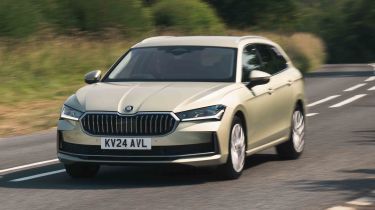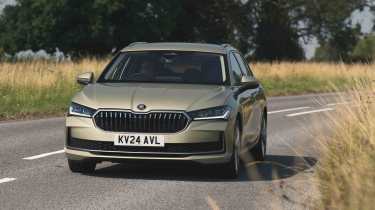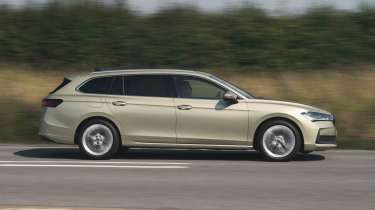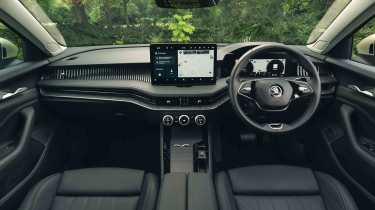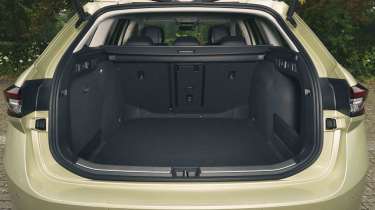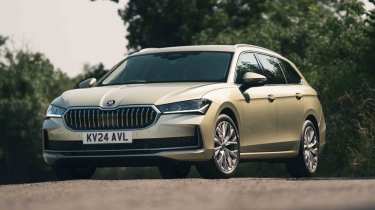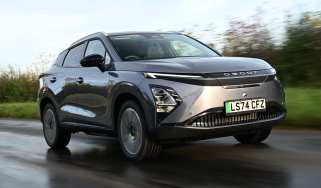Skoda Superb Estate review
Skoda’s big Superb Estate really is a superb estate. It doesn’t rewrite the rulebook, but it didn’t need to

Is the Skoda Superb Estate a good car?
The Skoda Superb Estate delivers on space, quality and cleverness just as strongly as the previous model. There have been thoughtful improvements to the interior design and to the hybrid powertrains to boost efficiency and lower running costs.
For many, the diesel will still hold plenty of appeal, as it roundly covers all the bases a family car buyer looking for something with additional practicality could want. For those not taken with an SUV, the Superb Estate makes for a brilliant package.
|
Key specs | |
|
Fuel type |
Mild-hybrid petrol, petrol, diesel and plug-in hybrid |
|
Body style |
5-door estate car |
|
Powertrain |
1.5-litre 4cyl mild-hybrid petrol 2.0-litre 4cyl diesel 2.0-litre 4cyl petrol* (not available to order yet) 1.5-litre 4cyl petrol plus electric motor and 25.7kWh battery |
|
Safety |
5-star Euro NCAP (2024, based on VW Passat) |
|
Warranty |
3-years/60,000 miles |
How much will the Skoda Superb Estate cost?
Few mainstream cars out there garner such enthusiasm among owners as the Skoda Superb Estate, so when the time came to replace it, Skoda had a tough job on its hands to impress the loyal customer base that has long valued this estate car, for its interior space, build quality and value.
The latest incarnation goes about its task with an all-new body, interior and tech, plus significant upgrades to the powertrains – some of which now feature mild-hybrid options. Starting on the practicality front, the new model is now 40mm longer than before, with a boot capacity that’s bigger to the tune of 30 litres at 690 litres. Unlike the Volkswagen Passat (with which this car shares much of its underlying tech), the Skoda Superb is also available in hatchback form for those after a spacious family car, but don’t need removal-van levels of boot space.
More reviews
Car group tests
In-depth reviews
Long-term tests
Road tests
- Skoda Superb SE L 2.0 TDI DSG review: large family car is better than ever
- New Skoda Superb prototype review
Used car tests
A number of the Skoda Superb Estate’s key rivals (like the Ford Mondeo and Vauxhall Insignia) have kicked the bucket, leaving its Volkswagen Passat sister car as its biggest rival. For a little more styling flair, the unconventional Citroen C5 X is also worth considering. Mid-size SUVs such as the Hyundai Tucson could also turn heads away from the Superb Estate, along with non-plug-in hybrid rivals like the Toyota Corolla Touring Sports.
The Skoda Superb Estate remains impressive value for money, because prices start at a little over £36,000. The entry-level SE Technology spec – which Skoda expects to be the most popular with Brits – comes generously equipped with a big touchscreen, 10.25-inch digital driver’s display, wireless Apple Carplay and Android Auto smartphone connectivity, a cooled wireless charging pad, keyless start, heated and massaging front seats with adjustable lumbar support, a reversing camera, adaptive cruise control, lane-departure warning and traffic-jam assist.
Mid-range SE L trim adds larger 18-inch rims, sports comfort seats with ventilation, an electric tailgate with an electric sliding parcel shelf for the boot, and matrix LED headlights with dynamic range control and cornering functionality. Those after a sportier look might want to consider the aptly named SportLine trim, which has plenty of black exterior trim, larger 19-inch alloy wheels, sports suspension that lowers the car by 15mm, plus some interior trim details such as carbon-effect trim, a pair of front sports seats, black headliner, and some stainless steel pedals.
The top-of-the-range Laurin & Klement costs significantly more than the base car, and gets some dark chrome exterior and interior trim, a choice of either black or cognac brown leather upholstery, a heated steering wheel, heated rear seats, and a heated windscreen. Range-topping models feature Dynamic Chassis Control Plus (DCC Plus) adaptive dampers, which are an expensive option on SE L trim.
Engines, performance & drive
The engine range of the Skoda Superb Estate starts with a 148bhp 1.5-litre four-cylinder petrol, which will get from 0 to 62mph in a time of 9.3 seconds and hit a top speed of 137mph. In everyday driving, it’s a smooth unit with a slick stop/start system thanks to its mild-hybrid technology, but we can’t help but think it might get overwhelmed with a full car load. It also drones when accelerating hard and tends to hang on to gears for too long until you’re up to speed. You can solve that problem with the 261bhp 2.0 TSI, which has a 5.6-second 0-62mph sprint and a 155mph top speed, but you’ll pay the price for that performance at the pumps.
The engine that makes the most sense is the 148bhp 2.0 TDI. Apart from some low-speed grumbliness, it quietens down once it gets going, and its extra torque over the 1.5 TSI means it gets from 0 to 62mph in a slightly quicker 9.2 seconds. This responsive engine pairs well with the standard seven-speed dual-clutch DSG automatic. A more potent 190bhp version is also available, which drops the 0-62mph dash to 7.5 seconds, but we don’t think the additional expense will be worthwhile unless you really need the extra traction of its standard four-wheel drive system to pull a caravan out of a damp grassy field.
While we’re yet to try it, the 201bhp Superb iV plug-in hybrid would be a good choice for company car drivers thanks to its up to 84-mile electric range. It uses the combined efforts of a 1.5-litre petrol and an electric motor to sprint to 62mph in 8.1 seconds, and on to a top speed of 136mph.
|
Model |
Power |
0-62mph |
Top speed |
|
Superb Estate 1.5 TSI 150 e-Tec MHEV DSG |
148bhp |
9.3 seconds |
137mph |
|
Superb Estate 2.0 TSI 265 4x4 petrol DSG |
262bhp |
5.6 seconds |
155mph |
|
Superb Estate 2.0 TDI 150 diesel DSG |
148bhp |
9.3 seconds |
137mph |
|
Superb Estate 1.5 204 iV PHEV DSG |
201bhp |
8.1 seconds |
136mph |
The steering is fairly typical of any Skoda product, which is to say that it’s accurate, responsive and consistent, without being overly light or spongy. Like so many of the dynamic elements on the Superb Estate, the steering is variable and dependent upon the driver mode. We think given this car’s target market, you’re better off leaving it in its regular driving mode because the slightly heavier weighting in Sport mode doesn’t feel entirely necessary.
The drive modes have a significant effect on ride quality when the Superb is fitted with the optional DDC Pro adaptive dampers. Switch the system over to Comfort mode and the ride, even on the 19-inch wheels of our test car, was superbly — pardon the pun, it was going to happen eventually — supple and refined. As speeds rise, this can leave the body control feeling a touch wayward, but this is where a switch to the tighter Sports mode firms things right back up, fixing the problem.
Being Skoda’s latest system, it’s adjustable on the same sliding scale as used in many high-end VWs, allowing fine control of the dampers according to your preference – if only it was less fiddly to access the customisable driving mode menu. The soothing ride is then only heightened by the excellent road noise suppression and low levels of wind noise.
MPG & running costs
The most efficient petrol is the entry-level 1.5-litre mild-hybrid petrol, which gets a combined figure of 52.8mpg and emits 122g/km of CO2. It uses a 48-volt starter generator that helps save fuel by smoothly stopping the engine in traffic or when coasting, and provides a small power boost to the engine when accelerating, lessening the workload. It’s certainly more efficient than the 2.0 TSI, which doesn’t use mild-hybrid technology and has a weight penalty from its standard four-wheel drive system. It only gets an economy figure of 35.7mpg and emissions of 180g/km.
The 148bhp 2.0-litre diesel is expected to be a big seller. Its high fuel economy of 56.9mpg and emissions of just 130g/km are likely to win favour with many private buyers, and we saw a figure of around 55mpg despite plenty of low-speed traffic. The more potent 191bhp version with four-wheel drive is slightly less efficient, at 47.5mpg and 156g/km.
Company car drivers will most likely choose the iV plug-in hybrid version, which uses a 1.5-litre petrol combined with an electric motor – the latter of which gets its electricity from a sizeable 25.7kWh battery (19.7kWh useable), providing up to 84 miles of electric range. Its combined fuel economy figure is 783.4mpg, although our experience with plug-in hybrid cars suggests that you won’t get near that in the real world. Both petrol and diesel models have a 66-litre fuel tank, but the iV plug-in hybrid has a smaller 45-litre tank.
|
Model |
MPG |
CO2 |
Insurance group |
|
Superb 1.5 TSI e-TEC MHEV |
52.8mpg |
122g/km |
23E |
|
Superb 2.0 TSI petrol 4x4 |
35.7mpg |
180g/km |
35E |
|
Superb 2.0 TDI 150 diesel |
56.9mpg |
130g/km |
24E |
|
Superb iV 1.5 PHEV |
783.4mpg |
8g/km |
30E |
Much like its Volkswagen Passat eHybrid sibling, the Superb iV can be rapidly charged using a 50kW charger, meaning a 10 to 80 per cent top-up could take as little as 25 minutes. That’ll be an expensive way of running a plug-in hybrid, so most will utilise a 7kW home wallbox charger using cheaper off-peak electricity, and that’ll be enough to refill a flat battery in around four hours.
The plug-in hybrid Skoda Superb iV has the lowest Benefit-in-Kind (BiK) company car tax rates in the Superb Estate range, eclipsing the petrol and diesel versions by a distance, but you could still save more by opting for the brand’s Skoda Enyaq electric car, which happens to be just as practical.
Most versions of the Superb Estate (everything below a 2.0 TDI 150 SE L) avoid the surcharge for vehicles costing over £40,000 when new, whereas every model above that, including all plug-in hybrid Superb iV models, will incur this additional charge on top of the yearly Vehicle Excise Duty (VED) tax. This will apply from the second year the car is taxed up until it is six years old.
The Skoda Superb Estate has lower insurance group ratings than its VW Passat sibling, starting in group 23 before rising to group 35 for the 2.0 TSI 4x4 petrol. For comparison, the VW Passat starts in group 30, before going up to group 40 for the quickest eHybrid 272 plug-in hybrid
Over a typical three-year/36,000-mile ownership period, our experts predict that the Skoda Superb range should maintain between 46 to 47 per cent of its resale value, with the worst being the four-wheel drive 2.0 TDI 193 SE L, and the best being the 1.5 150 TSI SE L. Those percentage figures are similar to those of the more expensive Volkswagen Passat.
Design, interior & technology
Looks-wise, the Skoda Superb Estate is more of an evolution of what went before than anything too groundbreaking. That’s not to say the designers have been lazy, because they’ve managed to cut down the coefficient of drag by 15 per cent to 0.25Cd, bringing benefits not just in terms of wind noise, but also fuel efficiency and lower emissions.
Inside is where more noticeable changes have been made, with a greater reliance on digital screens from a standard 10.25-inch virtual cockpit for the driver, and a sizeable 13-inch central touchscreen.
However, unlike its Volkswagen Passat stablemate, the Super Estate uses clever ‘Smart Dials’ on the centre console in a quest to bring back physical controls. A set of three active rotating controls can be used to control various functions, with the outer dials used to control the temperature of the two front climate control zones, plus the heated or (if fitted) ventilated front seats, while the middle display handles four different functions, including the fan direction and drive modes. We’ve seen these sorts of controls before on cars from Jaguar and Land Rover, and as in those models the system works brilliantly, giving fast fingertip control to many elements that would otherwise be buried in the touchscreen.
We’re yet to try an entry-level SE Technology version, but the mid-range SE L we have tried feels well-built inside and is furnished with plush materials. You can go above this with the top-of-the-range Laurin & Klement, which has leather upholstery on the seats in either black or cognac, but we’re not sure it adds much value over and above much more affordable versions. Going for SportLine trim adds a pair of sports seats up front covered in Microsuede upholstery, some carbon-effect trim across the dashboard and door cards, plus stainless steel pedals.
Sat-nav, stereo and infotainment
Every Skoda Super Estate has a 10.25-inch Virtual Cockpit digital driver display and a 13-inch central touchscreen. The former is one of the best systems of its kind, and just like the Audi Virtual Cockpit upon which it is based, it's a highly configurable display that’s controlled via simple buttons on the steering wheel. We like the fact that its possible to show navigation directions on a map display right in front of the driver while also being able to have other information clearly viewable around it. A head-up display is available as an option for just over £500 to project important information, such as your speed, onto the windscreen within your line of sight.
While a larger 15-inch central touchscreen is available with the VW Passat, the 13-inch display in the Superb Estate is big enough and has really clear graphics. The menu layout is, by and large, intuitive, and you can customise it to include the shortcuts to your most used functions. The impressive computing hardware on board also makes for super quick responses and for fingerprint-phobes, there’s a special cleaning block that lives in the glovebox and quickly buffs the screen clean. There’s also a place to rest your hand to make the screen easier to interact with on the move.
Wireless Apple Carplay and Android Auto are standard across the range, as is a wireless phone charging pad to keep your device topped up. We were impressed by the quality of the optional 13-speaker Canton sound system that’s a near £800 option on mid-range SE L, or comes as standard on Laurin & Klement trim.
Boot space, comfort & practicality
Space in the front of the Skoda Superb Estate was never a problem before, and this latest one is slightly longer and taller than the old car. The wheelbase (the distance between the wheels) and width are the same as before at 2,841mm and 1,849mm, respectively, but the Estate is now 4,902mm long, 1,482mm tall and wide.
Some small changes have been made inside to free up a little more space up front, such as moving the gear selector to the steering column (as with the Volkswagen Passat) to free up more storage space in the centre console. The covered compartment houses the wireless charging pad – which includes a cooling function to prevent your smartphone from overheating – and two cup-holders. Under the split-opening armrest, there is the ‘Jumbo Box’ with 5.5 litres of storage capacity.
Just like the hatch, the Superb Estate includes the brand’s ‘Simply Clever’ convenience touches, with 28 helpful features throughout. Familiar examples include the umbrella hidden in the driver’s door, and a handy ice scraper (both of which are made from more sustainable materials).
|
Dimensions | |
|
Length |
4,902mm |
|
Width |
1,849mm |
|
Height |
1,482mm |
|
Number of seats |
5 |
|
Boot space |
690-1,920 litres (510-1,770 litres iV PHEV) |
There continues to be a huge amount of space in the back of the Skoda Superb Estate for a six-foot passenger to sit behind a similarly-sized driver, with masses of legroom and headroom. The front seats are mounted high enough off the floor to enable those in the back to stretch their feet out under the seat ahead of them.
The estate version boasts an enormous 690 litres of load space – up 30 litres over the equivalent version of the old model. This increases to 1,920 litres with the rear seats folded, but we’d advise you to specify the optional adjustable-height boot floor for around £300. This enables you to have a mostly flat load area that makes loading longer items easier. Plug-in hybrid models lose a bit of capacity due to the hybrid system taking up space below the boot floor, but it still has a useable 510 to 1,770-litres of capacity available, which is even greater than the plug-in hybrid version of the Mercedes E-Class Estate.
Plug-in hybrid versions of the Superb Estate have a maximum towing capacity of 1,800kg, while the mild-hybrid petrol engine allows for a maximum load of 1,900kg. If your caravan is heavier still, diesel-powered Superbs can haul up to 2,200kg. Skoda also offers an electric tow bar with an adaptor on the Superb for a little over £1,100, or a shade over £1,200 for the same electric tow bar with a trailer assist system to help when reversing.
Safety & reliability
Since the Skoda Superb Estate is a relatively new arrival on our shores, we don’t yet have enough data to include it in our latest 2024 Driver Power customer satisfaction rankings. According to 2023 data, the Skoda brand has dipped in the manufacturer rankings to 20th out of 32 manufacturers. Hopefully, a new range of Skoda models will improve matters in the next survey.
Safety experts Euro NCAP awarded the Superb Estate (based on the structurally identical Volkswagen Passat) the maximum five out of five-star rating. Interestingly, not only did the Superb Estate do better than the pricier BMW 5 Series in the adult and child occupant categories, but the Superb Estate performed better across the board than the bigger Skoda Kodiaq, a result some may find surprising.
A contributing factor as to why the Superb Estate received such a high score is because of its long list of standard safety assistance features. This includes autonomous emergency braking with pedestrian and cyclist detection to avoid or mitigate low-speed collisions with other vehicles and vulnerable road users. There’s blind spot detection to inform you of other vehicles alongside you when you signal to change lanes on the motorway, and lane keep assistance to help keep you within your lane.
You can add rear side airbags to your Superb as part of the Simply Clever Family Package, which costs just under £700. A tyre pressure monitoring system costs an extra £145.
|
Key standard safety features |
Euro NCAP safety ratings |
|
The Superb Estate comes with a three-year/60,000-mile (whichever comes soonest) warranty, which is the same as what you’ll find with most Volkswagen group cars - including the latest Volkswagen Passat. This can be extended to four years/80,000 miles for under £400 or up to a maximum of five years/100,000 miles for just over £800. There are plenty of manufacturers out there that offer longer warranties, such as Hyundai, which can provide a five-year unlimited mileage warranty as standard, or Toyota, which can offer an extended warranty of up to 10 years/100,000 miles just by having your car serviced annually at a Toyota franchise dealership.
Servicing for the 1.5 eTSI, 2.0 TDI and plug-in hybrid iV models is required every 12 months or 18,600 miles, whichever comes first. Additionally, the 2.0 TDI needs a new timing belt every 130,000 miles. When you purchase your Skoda, you can also specify a service plan for just under £500 to cover the first two services
Skoda Superb Estate alternatives?
The obvious alternative to the Skoda Superb Estate would be the brand’s large SUV offering, the Skoda Kodiaq. The Kodiaq can give you the extra versatility of seven seats for around £1,300 more than a like-for-like entry-level Superb Estate, or the Kodiaq can be had in five-seater form with the same plug-in hybrid system as the Superb Estate. You’d have to live with a nine-mile deficit in electric range and an increase of one per cent in terms of Benefit-in-Kind (BiK) for the Kodiaq iV compared with its more frugal Superb Estate iV sibling, though.
Similar estate car competition to the Superb Estate comes from the slightly pricier Volkswagen Passat (now only available as an estate). The quirky Citroen C5 X is a more affordable alternative if you can live with its smaller boot. Then there’s the Toyota Corolla Touring Sports, which sacrifices some interior space compared with the Superb Estate, but could work as a more efficient option compared with our preferred diesel Skoda Superb Estate. The hybrid system in the Corolla doesn’t require you to regularly plug it in, unlike the plug-in hybrid Superb Estate iV.
